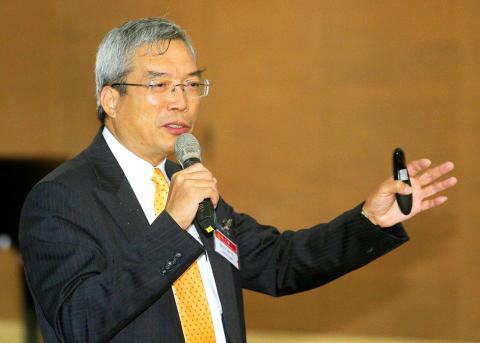A commentator urged Taiwanese to understand the basic philosophy of US president-elect Donald Trump, saying billionaire real-estate mogul benefited from then-US president Ronald Reagan’s economic policy in the 1980s and became a believer in “Reaganomics.”
Investment Media and Wealth Magazine chairman Hsieh Chin-ho (謝金河) spoke about his view on why Trump took a telephone call from President Tsai Ing-wen (蔡英文) on Friday last week and the effects the 10-minute call could have.
China was initially relieved — and even happy — that Trump won the US presidential election, believing he would be “easier to deal with” than former US secretary of state Hillary Rodham Clinton, Hsieh said on Facebook on Sunday.

Photo: CNA
However, Beijing remains highly uncertain as to what Trump’s policies will be, he said.
To better understand Trump as he heads to the White House, Hsieh said that much can be learned from recalling that in 1980 the US was reeling from the aftermath of the Vietnam War and “stagflation,” resulting in a basic interest rate of 20 percent.
When then-Republican candidate Reagan hit the campaign trail, his slogan of “Let’s make America great again” resonated well with voters, Hsieh said, adding that then-US president Jimmy Carter sustained a resounding defeat at the polls.
After taking office, Reagan immediately cut taxes, increased government spending and undertook wide-reaching deregulation to free up the economy, helping the US weather the downturn of 1981-1982, said Hsieh, who also hosts a TV program on finance and economy.
It was Reagan’s tough defense policy, boosted by an uptick in military spending, that forced then-superpower Soviet Union to back down and laid the groundwork for the fall of the Berlin Wall and the Soviet collapse in 1989 and 1991 respectively.
Reagan’s two-term presidency ended in 1988.
Trump has modeled his economic policy on Reagan’s — from his main slogan to tax cuts, deregulation and boosting infrastructure spending, Hsieh said, adding that Trump made his fortune in the 1980s through real-estate investments, making him a beneficiary of Reaganomics.
Reaganomics prevailed during the Cold War and now Trump is trying to “make America great again” before China surges ahead economically to become a superpower, he said, adding that world affairs will be dominated by that contest over the next 10 years.
In the face of rapid and huge changes, nations are seeking to be strong economically and if Taiwan continues to allow the pursuit of “justice and fairness” to blunt its economic competitiveness, “it might not have a future.”
Hsieh’s comments drew some criticism from netizens, with one asking: “What’s wrong with seeking social justice and fairness?”
“Does our current economic system, which features an unfair tax system — placing too heavy a burden on the salaried class — not favor the capitalists enough?” the netizen said.

An essay competition jointly organized by a local writing society and a publisher affiliated with the Chinese Communist Party (CCP) might have contravened the Act Governing Relations Between the People of the Taiwan Area and the Mainland Area (臺灣地區與大陸地區人民關係條例), the Mainland Affairs Council (MAC) said on Thursday. “In this case, the partner organization is clearly an agency under the CCP’s Fujian Provincial Committee,” MAC Deputy Minister and spokesperson Liang Wen-chieh (梁文傑) said at a news briefing in Taipei. “It also involves bringing Taiwanese students to China with all-expenses-paid arrangements to attend award ceremonies and camps,” Liang said. Those two “characteristics” are typically sufficient

A magnitude 5.9 earthquake that struck about 33km off the coast of Hualien City was the "main shock" in a series of quakes in the area, with aftershocks expected over the next three days, the Central Weather Administration (CWA) said yesterday. Prior to the magnitude 5.9 quake shaking most of Taiwan at 6:53pm yesterday, six other earthquakes stronger than a magnitude of 4, starting with a magnitude 5.5 quake at 6:09pm, occurred in the area. CWA Seismological Center Director Wu Chien-fu (吳健富) confirmed that the quakes were all part of the same series and that the magnitude 5.5 temblor was

The brilliant blue waters, thick foliage and bucolic atmosphere on this seemingly idyllic archipelago deep in the Pacific Ocean belie the key role it now plays in a titanic geopolitical struggle. Palau is again on the front line as China, and the US and its allies prepare their forces in an intensifying contest for control over the Asia-Pacific region. The democratic nation of just 17,000 people hosts US-controlled airstrips and soon-to-be-completed radar installations that the US military describes as “critical” to monitoring vast swathes of water and airspace. It is also a key piece of the second island chain, a string of

The Central Weather Administration has issued a heat alert for southeastern Taiwan, warning of temperatures as high as 36°C today, while alerting some coastal areas of strong winds later in the day. Kaohsiung’s Neimen District (內門) and Pingtung County’s Neipu Township (內埔) are under an orange heat alert, which warns of temperatures as high as 36°C for three consecutive days, the CWA said, citing southwest winds. The heat would also extend to Tainan’s Nansi (楠西) and Yujing (玉井) districts, as well as Pingtung’s Gaoshu (高樹), Yanpu (鹽埔) and Majia (瑪家) townships, it said, forecasting highs of up to 36°C in those areas